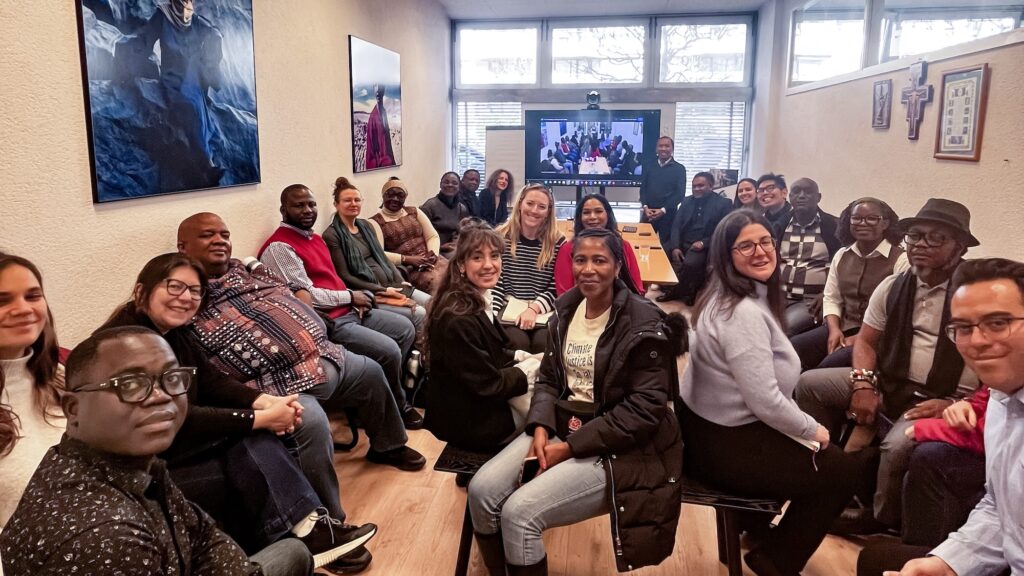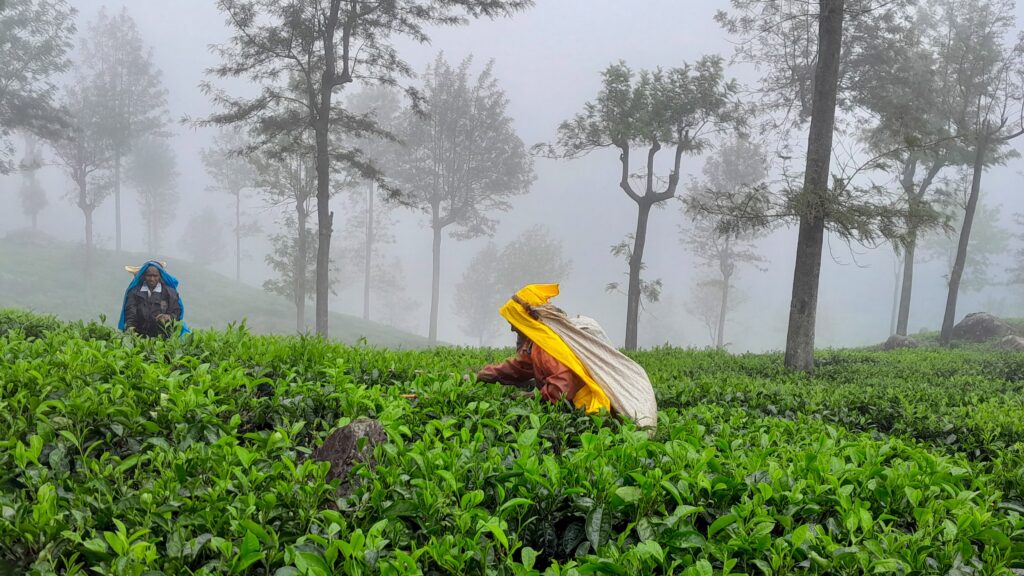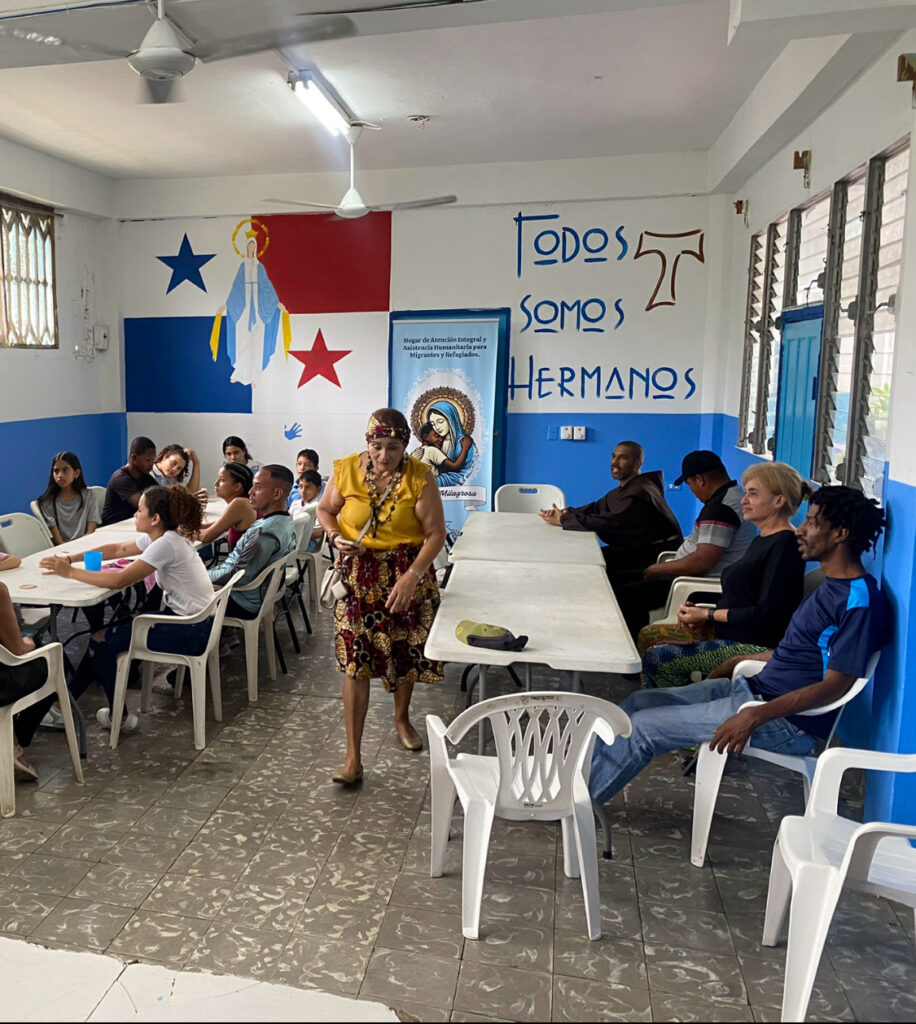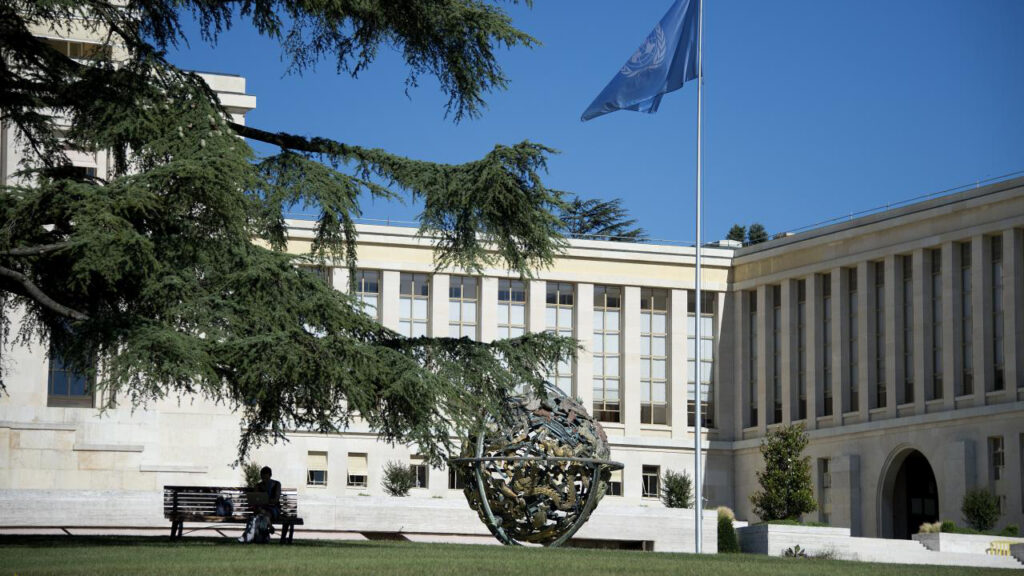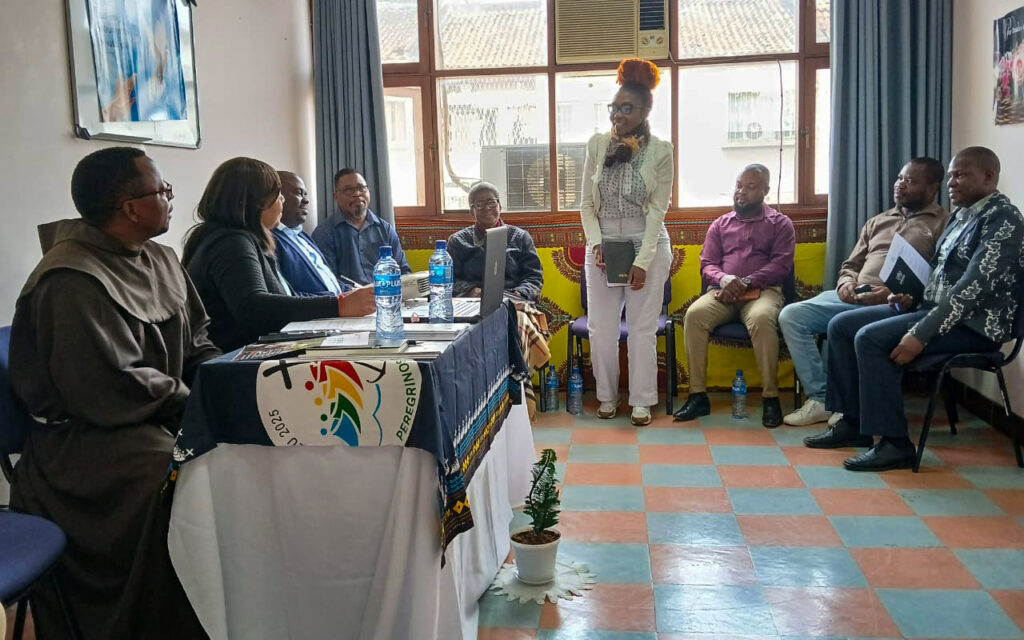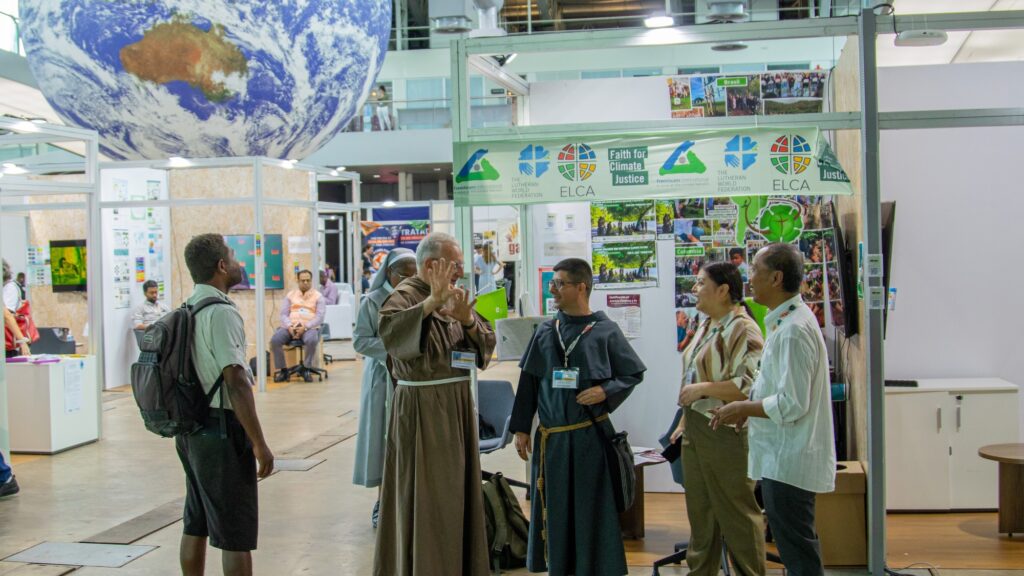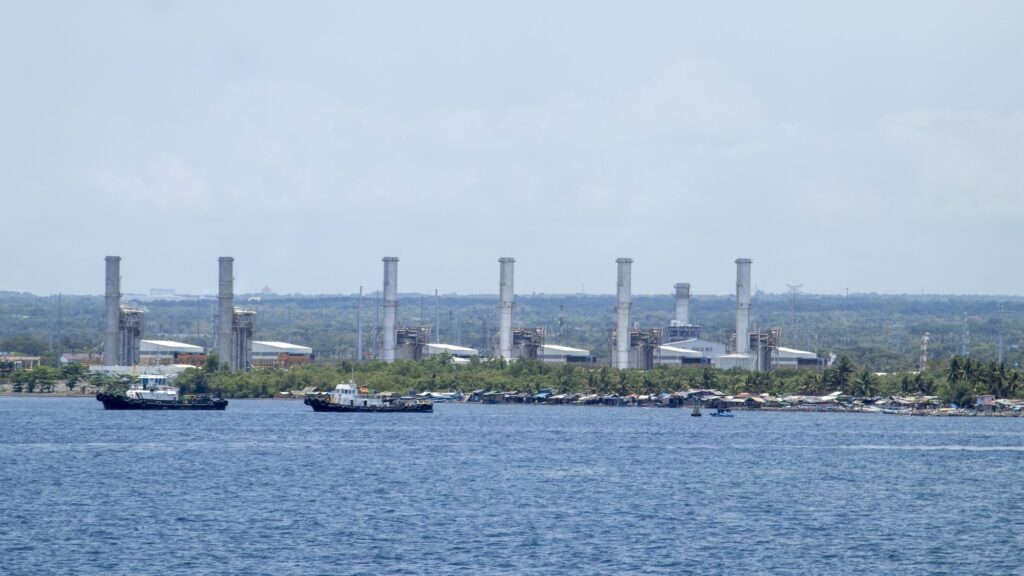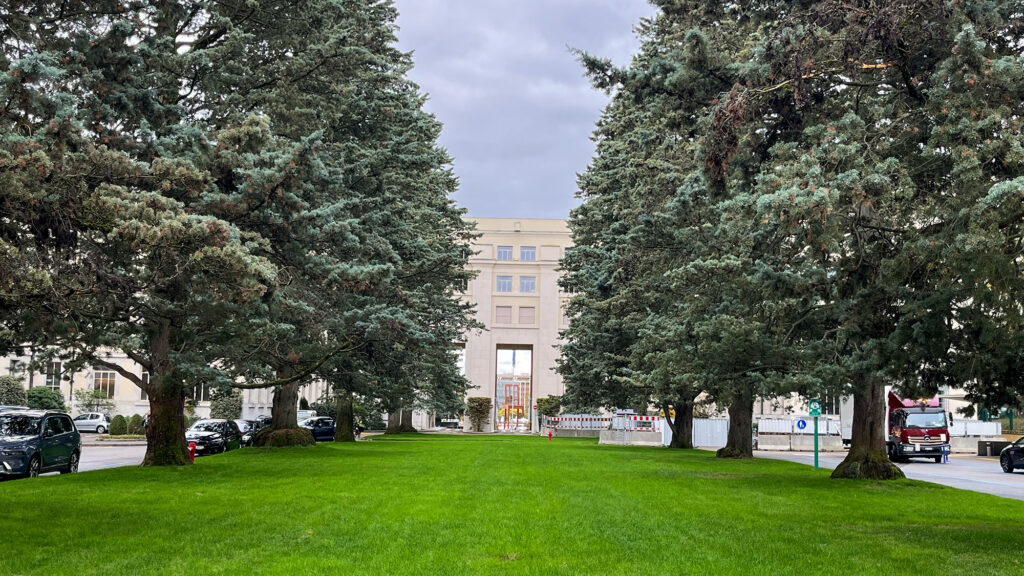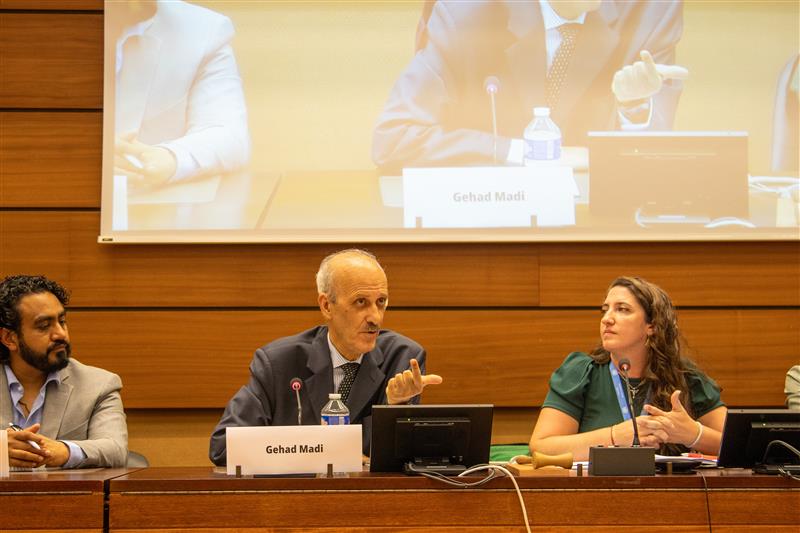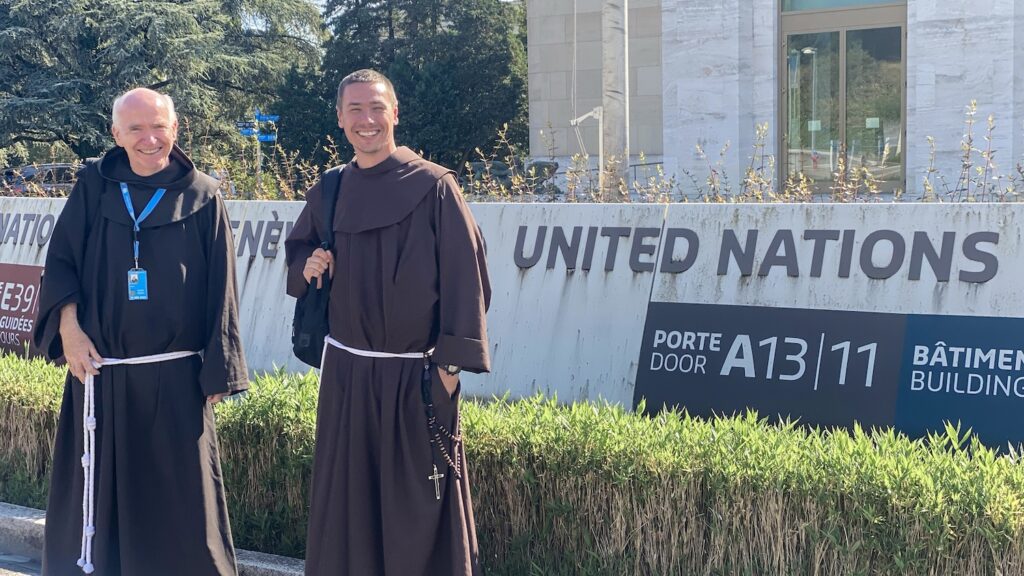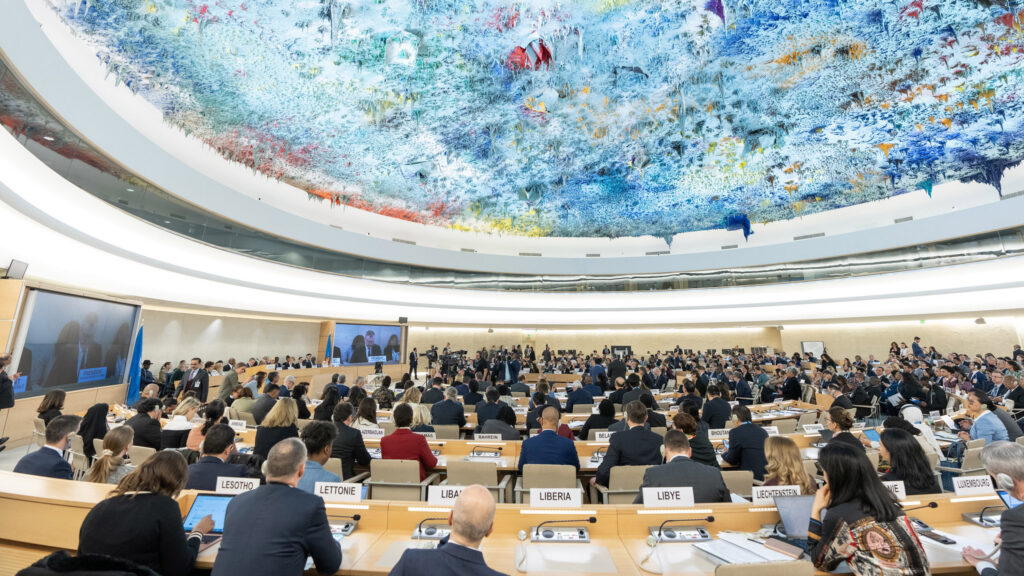Our Focus
Equal Dignity
The inherent dignity of all humans is a cornerstone of the Franciscan understanding of the world.
Starting with Francis seeking the company of lepers, who at the time were – quite literally – kept on the margins of society, Franciscan sisters and brothers embrace those that are excluded or left behind.
Today, Franciscans continue to oppose the many different persisting forms of discrimination, extreme poverty, and inequalities.
Around the world, they support marginalized peoples and communities in affirmation that all of us have equal dignity and inherent human rights that need to be defended.
This takes many forms – from establishing networks and shelters that provide aid and protection to taking to the streets in solidarity. In doing so, Franciscans often share a lived experience with affected people and communities.
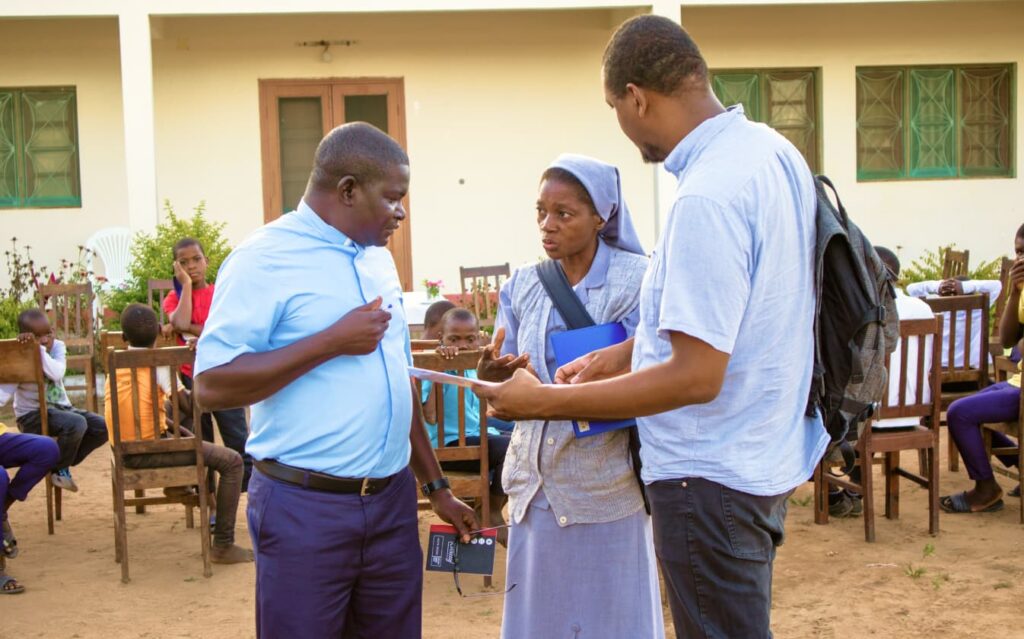
Franciscan sisters and brothers embrace those that are excluded or left behind.
Our Goals
Ensure that the concerns of Franciscans supporting, and working with, people experiencing marginalization and poverty are heard and acted on by relevant United Nations bodies.
The reality of human rights violations and abuses against marginalized groups like migrants and refugees is often invisible at the international level. Through our technical expertise, we work to alert the UN and help Franciscans to engage directly with its mechanisms that are most likely to make a real and positive change in their communities.
Support the struggles of people experiencing marginalization and contributing to their meaningful participation in the decisions that affect them.
Human rights advocacy can support grassroots struggles. Through local consultations and the development of various tools, FI helps Indigenous Peoples, and marginalized communities and individuals to participate effectively in advocacy strategies and actions for their rights.
Achieve better accountability for businesses whose activities have a negative impact on the enjoyment of human rights.
In today’s globalized economy, where business activities can stretch across borders and jurisdictions, human rights abuses as a result of such activities are too often committed with impunity. FI works toward higher global standards for the protection of human rights, for example through the negotiation of future legally binding rules for transnational corporations and other business enterprises.
Equal Dignity
The inherent dignity of all humans is a cornerstone of the Franciscan understanding of the world.
Starting with Francis seeking the company of lepers, who at the time were – quite literally – kept on the margins of society, Franciscan sisters and brothers embrace those that are excluded or left behind.
Today, Franciscans continue to oppose the many different persisting forms of discrimination, extreme poverty, and inequalities.
Around the world, they support marginalized peoples and communities in affirmation that all of us have equal dignity and inherent human rights that need to be defended.
This takes many forms – from establishing networks and shelters that provide aid and protection to taking to the streets in solidarity. In doing so, Franciscans often share a lived experience with affected people and communities.
Our Goals
Ensure that the concerns of Franciscans supporting, and working with, people experiencing marginalization and poverty are heard and acted on by relevant United Nations bodies.
The reality of human rights violations and abuses against marginalized groups like migrants and refugees is often invisible at the international level. Through our technical expertise, we work to alert the UN and help Franciscans to engage directly with its mechanisms that are most likely to make a real and positive change in their communities.
Support the struggles of people experiencing marginalization and contributing to their meaningful participation in the decisions that affect them.
Human rights advocacy can support grassroots struggles. Through local consultations and the development of various tools, FI helps Indigenous Peoples, and marginalized communities and individuals to participate effectively in advocacy strategies and actions for their rights.
Achieve better accountability for businesses whose activities have a negative impact on the enjoyment of human rights.
In today’s globalized economy, where business activities can stretch across borders and jurisdictions, human rights abuses as a result of such activities are too often committed with impunity. FI works toward higher global standards for the protection of human rights, for example through the negotiation of future legally binding rules for transnational corporations and other business enterprises.

Franciscan sisters and brothers embrace those that are excluded or left behind.
Peace & Human Rights
Francis’ experience as a soldier and prisoner during the wars between Assisi and Perugia led him to undergo a profound transformation. His rejection of violence ultimately led him to seek out Sultan al-Kamil of Egypt to broker a peace during the fifth crusade – a meeting that is still held up as an example of dialogue and understanding.
People caught in situations of armed violence and conflict don’t cease to have their inherent human rights: on the contrary, they need heightened protection – especially women and children. Today, Franciscans are often among those who provide material, psychological and legal support to affected communities. It is not uncommon for sisters and brothers to be some of the last to remain in situations of conflict and be able to document and transfer information to the international community.
In various countries, Franciscans stand up against the systemic and widespread repression of peaceful protests and work to address past human rights violations in the context of transitional justice. At times, they themselves are victims of repression, violence, and conflict.
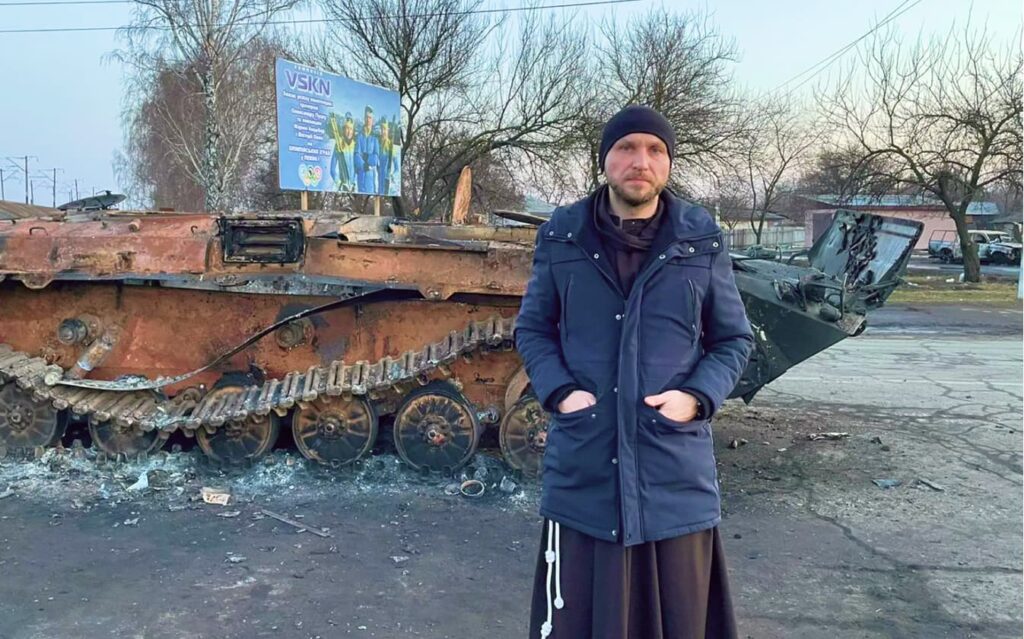
Across the world, Franciscans stand up against systemic and widespread repression.
Our Goals
Expose human rights violations in situations of conflict and armed violence.
The international community is often unable or unwilling to conduct direct investigations when addressing situations of conflict and armed violence. Because of their deep roots in affected communities, Franciscans are in a unique position to share reliable information with the United Nations. Together, we contribute to fighting impunity in highly sensitive and repressive contexts.
Promote the role of human rights in the prevention of conflict and demand increased accountability for policies that fuel strife and violence.
FI contributes to global debates and initiatives that foster the increased integration of human rights into UN work on conflict prevention, peacebuilding, and peacekeeping. We explore new ways to make more systematic and coordinated use of the different existing UN mechanisms in New York and Geneva. We also engage with States in debates that aim to include equal dignity and environmental justice into peace and security policies, including in the framework of the UN Security Council.
Peace & Human Rights
Francis’ experience as a soldier and prisoner during the wars between Assisi and Perugia led him to undergo a profound transformation. His rejection of violence ultimately led him to seek out Sultan al-Kamil of Egypt to broker a peace during the fifth crusade – a meeting that is still held up as an example of dialogue and understanding.
People caught in situations of armed violence and conflict don’t cease to have their inherent human rights: on the contrary, they need heightened protection – especially women and children. Today, Franciscans are often among those who provide material, psychological and legal support to affected communities. It is not uncommon for sisters and brothers to be some of the last to remain in situations of conflict and be able to document and transfer information to the international community.
In various countries, Franciscans stand up against the systemic and widespread repression of peaceful protests and work to address past human rights violations in the context of transitional justice. At times, they themselves are victims of repression, violence, and conflict.
Our Goals
Expose human rights violations in situations of conflict and armed violence.
The international community is often unable or unwilling to conduct direct investigations when addressing situations of conflict and armed violence. Because of their deep roots in affected communities, Franciscans are in a unique position to share reliable information with the United Nations. Together, we contribute to fighting impunity in highly sensitive and repressive contexts.
Promote the role of human rights in the prevention of conflict and demand increased accountability for policies that fuel strife and violence.
FI contributes to global debates and initiatives that foster the increased integration of human rights into UN work on conflict prevention, peacebuilding, and peacekeeping. We explore new ways to make more systematic and coordinated use of the different existing UN mechanisms in New York and Geneva. We also engage with States in debates that aim to include equal dignity and environmental justice into peace and security policies, including in the framework of the UN Security Council.

Across the world, Franciscans stand up against systemic and widespread repression.
Environmental Justice
The preservation of our common home – the planet we all share – is central to the teachings of Francis of Assisi, the patron saint of ecology. During his own lifetime, he was concerned with the impact of human activities on nature around him.
Today, our world is engulfed in a triple planetary crisis of climate disruption, biodiversity loss, and waste and pollution. These crises affect all human rights. Too often, people who have contributed least to their causes are already among those who suffer the greatest consequences – and most likely to be excluded from policies to mitigate the damage.
Franciscans have taken a decisive stand for environmental justice, following a tradition that is reflected in the choice of Laudato Si’ as the title of Pope Francis’ 2015 encyclical, in which he urges the world to take swift and unified action. Their work ranges from campaigns to inspire individual changes to supporting institutional reforms that protect the environment.
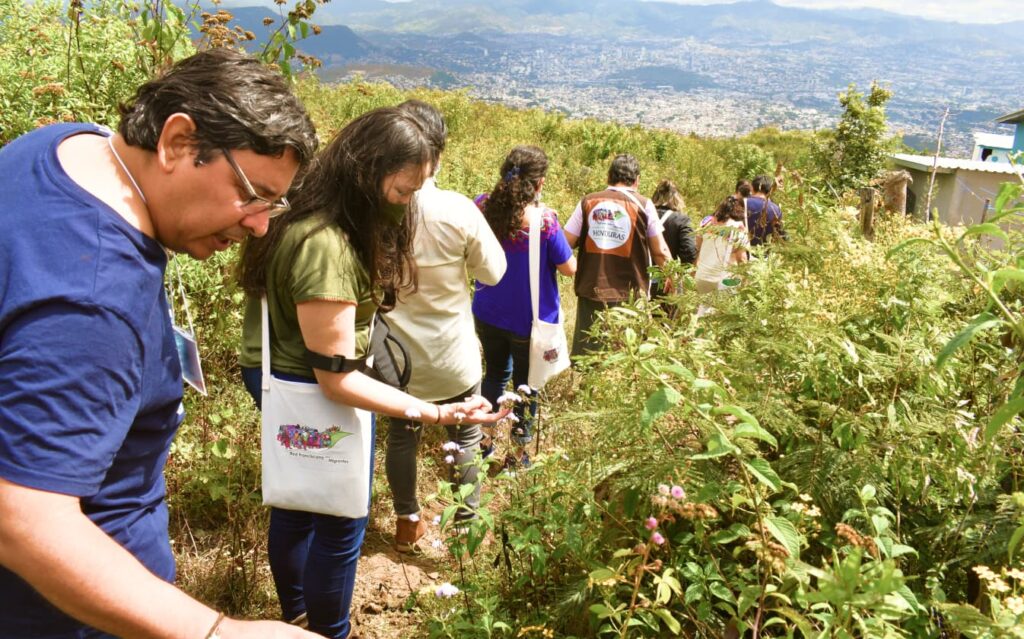
“Justice requires more than just listening. The biblical phrase is to ‘do justice’; justice is action.”
Our Goals
Strengthen the practical integration of human rights into environmental debates and actions at the local, national, and global levels.
The impacts of these environmental crises are already a daily reality for people around the world. Using the concrete experiences and cases raised by Franciscans, we explicitly link human rights and the environment in our work with United Nations mechanisms.
FI has played an active role as part of a global coalition working toward the international recognition of the right to a clean, healthy, and sustainable environment by the Human Rights Council in October 2021 and the General Assembly in July 2022. We now aim to further mainstream this right as a tool to claim environmental justice.
Strengthen the protection of the rights to water and sanitation.
Supporting the efforts of Franciscans and their communities at the grassroots we have developed a strong expertise on the rights to water and sanitation, notably by dealing with cases of pollution and toxic wastes. FI works to ensure that these rights are considered within the UN system in all their dimensions – not just economic and social, but also environmental, cultural, and spiritual.
Latest News
Environmental Justice
The preservation of our common home – the planet we all share – is central to the teachings of Francis of Assisi, the patron saint of ecology. During his own lifetime, he was concerned with the impact of human activities on nature around him.
Today, our world is engulfed in a triple planetary crisis of climate disruption, biodiversity loss, and waste and pollution. These crises affect all human rights. Too often, people who have contributed least to their causes are already among those who suffer the greatest consequences – and most likely to be excluded from policies to mitigate the damage.
Franciscans have taken a decisive stand for environmental justice, following a tradition that is reflected in the choice of Laudato Si’ as the title of Pope Francis’ 2015 encyclical, in which he urges the world to take swift and unified action. Their work ranges from campaigns to inspire individual changes to supporting institutional reforms that protect the environment.
Our Goals
Strengthen the practical integration of human rights into environmental debates and actions at the local, national, and global levels.
The impacts of these environmental crises are already a daily reality for people around the world. Using the concrete experiences and cases raised by Franciscans, we explicitly link human rights and the environment in our work with United Nations mechanisms.
FI has played an active role as part of a global coalition working toward the international recognition of the right to a clean, healthy, and sustainable environment by the Human Rights Council in October 2021 and the General Assembly in July 2022. We now aim to further mainstream this right as a tool to claim environmental justice.
Strengthen the protection of the rights to water and sanitation.
Supporting the efforts of Franciscans and their communities at the grassroots we have developed a strong expertise on the rights to water and sanitation, notably by dealing with cases of pollution and toxic wastes. FI works to ensure that these rights are considered within the UN system in all their dimensions – not just economic and social, but also environmental, cultural, and spiritual.

“Justice requires more than just listening. The biblical phrase is to ‘do justice’; justice is action.”
Latest News
Where We Work
Franciscans International currently has four regional programs that cover Africa, the Americas, Asia-Pacific, and Europe.
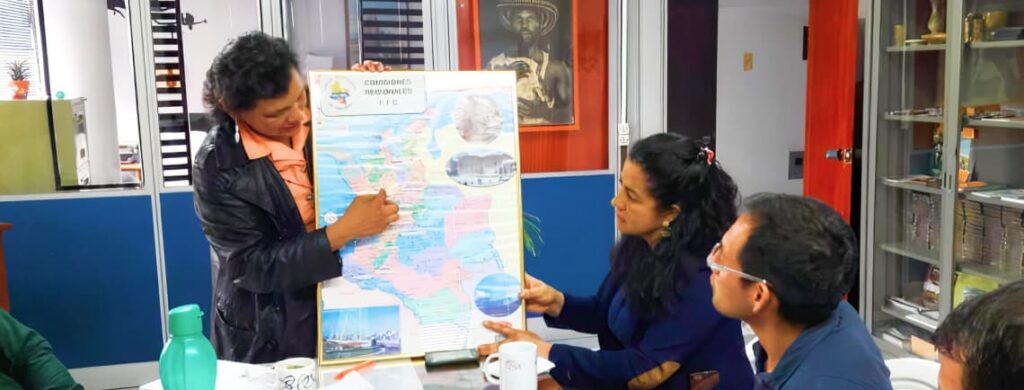
Our focus is based on the needs of Franciscans working on human rights issues at the regional and country levels.
Through our partnerships, we can engage together directly with United Nations mechanisms and raise local issues to gain international attention.
We work together over years to transform this international attention into concrete changes at the grassroots.
This is why we choose to work in a number of focus countries where we develop long-term partnerships to implement a sustained strategy.
Our joint work consists of providing Franciscans and other partners with the necessary advice and tools to engage in human rights advocacy, building networks to give weight to local action, and providing access to advocacy opportunities at the UN.
In a successful partnership, these three elements are fully exploited by the same partners on a long-term basis.
Where We Work
Franciscans International currently has four regional programs that cover Africa, the Americas, Asia-Pacific, and Europe.

Our focus is based on the needs of Franciscans working on human rights issues at the regional and country levels.
Through our partnerships, we can engage together directly with United Nations mechanisms and raise local issues to gain international attention.
We work together over years to transform this international attention into concrete changes at the grassroots.
This is why we choose to work in a number of focus countries where we develop long-term partnerships to implement a sustained strategy.
Our joint work consists of providing Franciscans and other partners with the necessary advice and tools to engage in human rights advocacy, building networks to give weight to local action, and providing access to advocacy opportunities at the UN.
In a successful partnership, these three elements are fully exploited by the same partners on a long-term basis.
Africa
Africa was the first region to be covered by a dedicated program at Franciscans International.

“Children are not going to school, many displaced people have nowhere to go – no food, no water, houses burnt down.”
Throughout the continent, different political and environmental crises pose a threat to human rights. We support sisters and brothers who work toward positive and sustainable change for marginalized groups and people living in extreme poverty.
In Benin, for example, Franciscans have set up a successful long-term initiative that combines international advocacy and local awareness campaigns to combat the ritual infanticide of children accused of witchcraft. This program was hailed as a best practice by UNICEF in 2019. Franciscans in Uganda have developed an advocacy partnership with FI to raise the rights of children, access to education and women and girls’ rights at the UN.
The extraction of natural resources has a long history of fueling human rights abuses throughout Africa. Franciscans and the wider Catholic Church have documented and denounced cases of exploitation, displacement, and environmental harm in, among others places, Mozambique.
Climate change and environmental degradation are also heavily impacting the continent. This is the case in southern Madagascar, where Franciscans seek to help those who are forced out of their homes.
In several places where conflicts have turned violent, Franciscans are in the unique but dangerous position to gather reliable testimonies that help to inform the international community. Through FI, the information they gather can confidentially reach the United Nations
Our Franciscan partners in the region
- Franciscan Family in Uganda
- Franciscan Family Madagascar
- Franciscains-Bénin
- Franciscan Family in Mozambique
FI and its partners also regularly join forces with other local, national, and international civil society organizations to share common concerns
Latest News
Latest Interventions
-

HRC60 – Mozambique
- 23/09/2025
-

HRC59 – Madagascar
- 01/07/2025
-

HRC58 – Uganda
- 12/03/2025
Africa
Africa was the first region to be covered by a dedicated program at Franciscans International.

Throughout the continent, different political and environmental crises pose a threat to human rights. We support sisters and brothers who work toward positive and sustainable change for marginalized groups and people living in extreme poverty.
In Benin, for example, Franciscans have set up a successful long-term initiative that combines international advocacy and local awareness campaigns to combat the ritual infanticide of children accused of witchcraft. This program was hailed as a best practice by UNICEF in 2019. Franciscans in Uganda have developed an advocacy partnership with FI to raise the rights of children, access to education and women and girls’ rights at the UN.
The extraction of natural resources has a long history of fueling human rights abuses throughout Africa. Franciscans and the wider Catholic Church have documented and denounced cases of exploitation, displacement, and environmental harm in, among others places, Mozambique.
Climate change and environmental degradation are also heavily impacting the continent. This is the case in southern Madagascar, where Franciscans seek to help those who are forced out of their homes.
In several places where conflicts have turned violent, Franciscans are in the unique but dangerous position to gather reliable testimonies that help to inform the international community. Through FI, the information they gather can confidentially reach the United Nations
Our Franciscan partners in the region
- Franciscan Family in Uganda
- Franciscan Family Madagascar
- Franciscains-Bénin
- Franciscan Family in Mozambique
FI and its partners also regularly join forces with other local, national, and international civil society organizations to share common concerns
“Children are not going to school, many displaced people have nowhere to go – no food, no water, houses burnt down.”
Latest News
Latest Interventions
-

HRC60 – Mozambique
- 23/09/2025
-

HRC59 – Madagascar
- 01/07/2025
-

HRC58 – Uganda
- 12/03/2025
Americas
The Americas are facing a multitude of intersecting human rights crises. As the effects of climate change are becoming more manifest, livelihoods and access to water are threatened across the continent.

“When people see the reality for migrants, it raises their awareness. They see innocent people who just want to live.”
In countries like Brazil, Guatemala, and Colombia, this situation is exacerbated by the development of mega-projects and extractive industries that operate without consulting affected communities, obtaining consent, or considering their impact on the environment, especially on sources of water and food.
Together with victims and local allies, Franciscans International brings attention to cases of human rights abuses and violations that are committed through business activities – often with the complicity of authorities. We stand firmly with local and Indigenous leaders who are frequently at risk themselves when opposing mega-projects.
Franciscans also work to build the capacity of marginalized communities, including Indigenous Peoples, to demand protection of their human rights.
Extreme poverty, violence, environmental degradation, and climate change have all fueled large migration flows across the continent. Franciscans have responded by forming a network of connected shelters that provide support to people on the move.
As governments grow increasingly hostile to migrants, refugees, and those working to protect them, FI brings cases of alleged human rights violations and first-hand accounts from these shelters to the UN.
Our Franciscan partners in the region
- Red Franciscana para Migrantes (RFM)
- JPIC Familia Franciscana de Colombia
- JPIC Familia Franciscana Unida de Guatemala
- Order of Friars Minor in El Salvador
- Serviço Franciscano de Solidariedade (SEFRAS)
- Serviço Franciscano de Justiça, Paz e Ecologia (SINFRAJUPE)
FI and its partners also regularly join forces with other local, national, and international civil society organizations to share common concerns
Latest News
Latest Interventions
Americas
The Americas are facing a multitude of intersecting human rights crises. As the effects of climate change are becoming more manifest, livelihoods and access to water are threatened across the continent.

In countries like Brazil, Guatemala, and Colombia, this situation is exacerbated by the development of mega-projects and extractive industries that operate without consulting affected communities, obtaining consent, or considering their impact on the environment, especially on sources of water and food.
Together with victims and local allies, Franciscans International brings attention to cases of human rights abuses and violations that are committed through business activities – often with the complicity of authorities. We stand firmly with local and Indigenous leaders who are frequently at risk themselves when opposing mega-projects.
Franciscans also work to build the capacity of marginalized communities, including Indigenous Peoples, to demand protection of their human rights.
Extreme poverty, violence, environmental degradation, and climate change have all fueled large migration flows across the continent. Franciscans have responded by forming a network of connected shelters that provide support to people on the move.
As governments grow increasingly hostile to migrants, refugees, and those working to protect them, FI brings cases of alleged human rights violations and first-hand accounts from these shelters to the UN.
Our Franciscan partners in the region
- Red Franciscana para Migrantes (RFM)
- JPIC Familia Franciscana de Colombia
- JPIC Familia Franciscana Unida de Guatemala
- Order of Friars Minor in El Salvador
- Serviço Franciscano de Solidariedade (SEFRAS)
- Serviço Franciscano de Justiça, Paz e Ecologia (SINFRAJUPE)
FI and its partners also regularly join forces with other local, national, and international civil society organizations to share common concerns
“When people see the reality for migrants, it raises their awareness. They see innocent people who just want to live.”
Latest News
Latest Interventions
Asia-Pacific
Our work in the Asia-Pacific builds on the deep roots of Franciscans living with communities affected by human rights violations and abuses.

“Logging pollutes the land, sea, bush, and river – at the same time, it pollutes the relationship between the people.”
In recent years, our engagement has focused on several protracted human rights crises and the increasingly dire impacts of the environmental crises.
Over 30.000 people have been killed in the so-called ‘war on drugs’ in the Philippines, where human rights defenders and critical voices continue to be intimidated. Following a long tradition, Franciscans have denounced these extra-judicial killings and provided support and sanctuary to witnesses, victims, and families.
In Sri Lanka, we relay the calls for accountability by Franciscans and wider Catholic church. Violations that occurred during the civil war, but also more recent repressive policies, as well as acts of terror such as the 2019 Easter Sunday bombings, need to be proactively investigated and addressed.
In Indonesia, Indigenous West Papuans face racial discrimination, violence, extrajudicial killing, arbitrary arrests, and exploitation of their natural resources. Tens of thousands of Indigenous people are displaced due to the ongoing armed conflicts. Local Franciscans work with us at the United Nations to demand accountability and justice.
In the Solomon Islands, Franciscans are also raising concerns at the UN related to the harmful exploitation of natural resources, such as industrial logging and its impacts on the rights of children and women.
More broadly, the very existence of the Pacific Island nations is threatened by climate change, although they have done little to contribute to the causes of this crisis. Together with local partners, we work toward stronger global commitments to fight this global environmental crisis.
Our Franciscan partners in the region
- Conference of Major Religious Superiors of the Philippines (CMSP)
- Franciscans Solidarity Movement for JPIC in the Philippines (FSMJPIC)
- Society of Saint Francis, Province of Solomon Islands
- JPIC Franciscans, Papua (SKPKC Fransiskan)
- JPIC Order of Friars Minor, Indonesia
- JPIC Order of Friars Minor, Sri Lanka
FI and its partners also regularly join forces with other local, national, and international civil society organizations to share common concerns
Latest News
Latest Interventions
-

HRC60 – Human Rights in the Philippines
- 03/10/2025
-

HRC60 – Sri Lanka
- 18/09/2025
-

HRC60 – The Philippines
- 16/09/2025
Asia-Pacific
Our work in the Asia-Pacific builds on the deep roots of Franciscans living with communities affected by human rights violations and abuses.

In recent years, our engagement has focused on several protracted human rights crises and the increasingly dire impacts of the environmental crises.
Over 30.000 people have been killed in the so-called ‘war on drugs’ in the Philippines, where human rights defenders and critical voices continue to be intimidated. Following a long tradition, Franciscans have denounced these extra-judicial killings and provided support and sanctuary to witnesses, victims, and families.
In Sri Lanka, we relay the calls for accountability by Franciscans and wider Catholic church. Violations that occurred during the civil war, but also more recent repressive policies, as well as acts of terror such as the 2019 Easter Sunday bombings, need to be proactively investigated and addressed.
In Indonesia, Indigenous West Papuans face racial discrimination, violence, extrajudicial killing, arbitrary arrests, and exploitation of their natural resources. Tens of thousands of Indigenous people are displaced due to the ongoing armed conflicts. Local Franciscans work with us at the United Nations to demand accountability and justice.
In the Solomon Islands, Franciscans are also raising concerns at the UN related to the harmful exploitation of natural resources, such as industrial logging and its impacts on the rights of children and women.
More broadly, the very existence of the Pacific Island nations is threatened by climate change, although they have done little to contribute to the causes of this crisis. Together with local partners, we work toward stronger global commitments to fight this global environmental crisis.
Our Franciscan partners in the region
- Conference of Major Religious Superiors of the Philippines (CMSP)
- Franciscans Solidarity Movement for JPIC in the Philippines (FSMJPIC)
- Society of Saint Francis, Province of Solomon Islands
- JPIC Franciscans, Papua (SKPKC Fransiskan)
- JPIC Order of Friars Minor, Indonesia
- JPIC Order of Friars Minor, Sri Lanka
FI and its partners also regularly join forces with other local, national, and international civil society organizations to share common concerns
“Logging pollutes the land, sea, bush, and river – at the same time, it pollutes the relationship between the people.”
Latest News
Latest Interventions
-

HRC60 – Human Rights in the Philippines
- 03/10/2025
-

HRC60 – Sri Lanka
- 18/09/2025
-

HRC60 – The Philippines
- 16/09/2025
Europe
Franciscans International launched its fourth regional program covering Europe in September 2023. This decision was made as a response to rising concerns brought up by Franciscans about human rights violations in Europe.
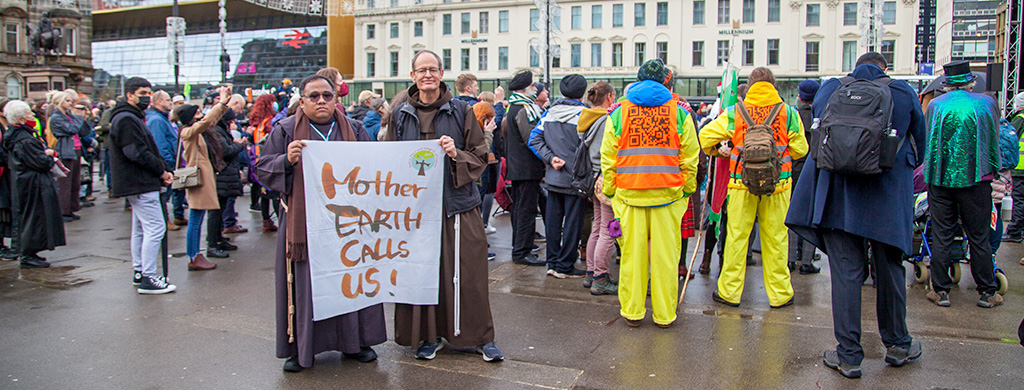
In these challenging times, I’m grateful the Franciscans have mobilised the resources to bring the violations they witness in Europe to the attention of the UN.
Throughout Europe, Franciscans offer support and aid to migrants, asylum seekers, and refugees. Accordingly, the immediate focus of the Europe program was on the migration crisis.
Drawing on these experiences, FI raised concerns over policies and practices in the British Isles, Italy, and Bosnia-Herzegovina that violate both international human rights standards and the international obligations of these countries. The program also continues to foster its relationship with the Franciscan Mediterranean Network, created in 2019 to, among other things, better protect vulnerable people on the move.
Seizing on the momentum provided by the recently recognized human right to a healthy environment, FI has also raised issues related to sustainable forest management in Italy and air pollution in Bosnia-Herzegovina. Additionally, the FI continues to advocate strengthening existing human rights mechanisms, such as National Institutions for Human Rights (NHRI).
With Europe and its business interests being a major contributor to the environmental crises and other human rights challenges, the program is expected to grow and expand its scope. The Europe program will further build the capacity of the Franciscan family to address decision-makers at the UN in a region that was outside of our advocacy scope for the past years. The work will remain deeply rooted in the Franciscan commitment to help those who are most affected by harmful policies and practices on the continent.
Our Franciscan partners in the region
- Franciscan Mediterranean Network
- Franciscan Missionaries of Mary, Sicily
- Franciscan Missionary Sisters of Assisi
- Housing for Migrants Friars, Italy
- JPIC Friars, Southern Europe Conference
- JPIC Friars, South Slavic Conference
- Order of Secular Franciscans, Italy
FI and its partners also regularly join forces with other local, national, and international civil society organizations to share common concerns
Latest News
Latest Interventions
-

UPR50 Croatia
- 13/11/2025
-

HRC59 – Bosnia and Herzegovina
- 02/07/2025
-

HRC59 – Italy
- 30/06/2025
Europe
Franciscans International launched its fourth regional program covering Europe in September 2023. This decision was made as a response to rising concerns brought up by Franciscans about human rights violations in Europe.

Throughout Europe, Franciscans offer support and aid to migrants, asylum seekers, and refugees. Accordingly, the immediate focus of the Europe program was on the migration crisis.
Drawing on these experiences, FI raised concerns over policies and practices in the British Isles, Italy, and Bosnia-Herzegovina that violate both international human rights standards and the international obligations of these countries. The program also continues to foster its relationship with the Franciscan Mediterranean Network, created in 2019 to, among other things, better protect vulnerable people on the move.
Seizing on the momentum provided by the recently recognized human right to a healthy environment, FI has also raised issues related to sustainable forest management in Italy and air pollution in Bosnia-Herzegovina. Additionally, the FI continues to advocate strengthening existing human rights mechanisms, such as National Institutions for Human Rights (NHRI).
With Europe and its business interests being a major contributor to the environmental crises and other human rights challenges, the program is expected to grow and expand its scope. The Europe program will further build the capacity of the Franciscan family to address decision-makers at the UN in a region that was outside of our advocacy scope for the past years. The work will remain deeply rooted in the Franciscan commitment to help those who are most affected by harmful policies and practices on the continent.
Our Franciscan partners in the region
- Franciscan Mediterranean Network
- Franciscan Missionaries of Mary, Sicily
- Franciscan Missionary Sisters of Assisi
- Housing for Migrants Friars, Italy
- JPIC Friars, Southern Europe Conference
- JPIC Friars, South Slavic Conference
- Order of Secular Franciscans, Italy
FI and its partners also regularly join forces with other local, national, and international civil society organizations to share common concerns
In these challenging times, I’m grateful the Franciscans have mobilised the resources to bring the violations they witness in Europe to the attention of the UN.
Latest News
Latest Interventions
-

UPR50 Croatia
- 13/11/2025
-

HRC59 – Bosnia and Herzegovina
- 02/07/2025
-

HRC59 – Italy
- 30/06/2025
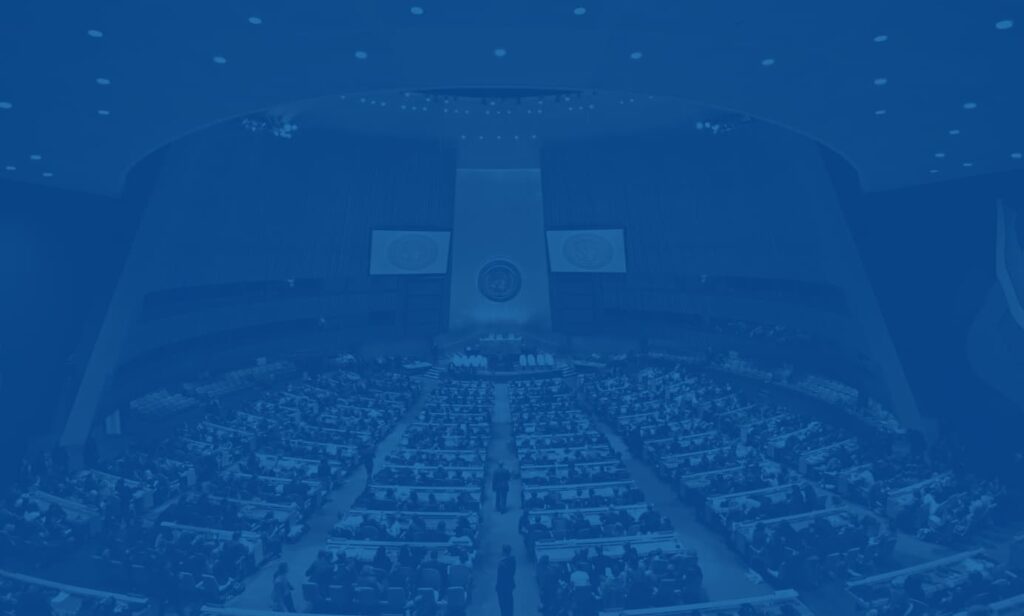
Subscribe
Would you like to become part of Franciscan action at the United Nations?
Sign up for our newsletter and get the latest developments on our common struggle for justice and human rights.
"*" indicates required fields

